- Home
- Julia Quinn
A Night Like This (Smythe-Smith Quartet) Page 5
A Night Like This (Smythe-Smith Quartet) Read online
Page 5
“I already asked you, what do you— Oh, never mind.” She rolled her eyes, shaking her head as if about to pacify a three-year-old. “I might have overheard Miss Wynter this morning, planning to take Harriet, Elizabeth, and Frances for a constitutional walk in Hyde Park.”
He smiled. “Have I told you recently that you are one of my very favorite cousins?”
“We are even now,” she warned him. “If you say a word to my mother . . .”
“I wouldn’t dream of it.”
“She’s already threatened to take me to the country for a week. For rest and recuperation.”
He swallowed a chuckle. “She’s concerned about you.”
“I suppose it could be worse,” Sarah said with a sigh. “I actually prefer the country, but she says we must go all the way to Dorset. I’ll spend the entire time in the carriage, and then I really will be ill.”
Sarah did not travel well. She never had.
“What is Miss Wynter’s Christian name?” Daniel asked. It seemed remarkable that he didn’t know it.
“You can discover that for yourself,” Sarah retorted.
He decided to allow her the point, but before he could say anything, Sarah turned her head sharply toward the door. “Ah, perfect timing,” she said, cutting through his words. “I do believe I hear someone coming down the stairs. Who could it possibly be, I wonder.”
Daniel stood. “My dear young cousins, I’m sure.” He waited until he saw one of them gallop past by the open doorway, then called out, “Oh, Harriet! Elizabeth! Frances!”
“Don’t forget Miss Wynter,” Sarah muttered.
The one who had walked past backed up and peered in. It was Frances, but she did not recognize him.
Daniel felt a pang in his chest. He had not expected this. And if he had, he wouldn’t have thought it would make him feel quite so wistful.
But Harriet was older. She had been twelve when he’d left for the Continent, and when she poked her head into the drawing room, she shrieked his name and came running in.
“Daniel!” she said again. “You’re back! Oh, you’re back you’re back you’re back.”
“I’m back,” he confirmed.
“Oh, it is so lovely to see you. Frances, it’s Cousin Daniel. You remember him.”
Frances, who looked to be about ten now, let out a dawning, “Oooooh. You look quite different.”
“No, he doesn’t,” remarked Elizabeth, who had come into the room behind them.
“I’m trying to be polite,” Frances said out of the corner of her mouth.
Daniel laughed. “Well, you look different, that’s for certain.” He bent down and gave her a friendly chuck on the chin. “You’re nearly grown.”
“Oh, well, I wouldn’t say that,” Frances said modestly.
“She’ll say everything else, though,” Elizabeth said.
Frances whipped her head around like a shot. “Stop that!”
“What happened to your face?” Harriet asked.
“It was a misunderstanding,” Daniel said smoothly, wondering how long it might take for his bruises to heal. He did not think he was particularly vain, but the questions were growing tiresome.
“A misunderstanding?” Elizabeth echoed. “With an anvil?”
“Oh, stop,” Harriet admonished her. “I think he looks very dashing.”
“As if he dashed into an anvil.”
“Pay her no attention,” Harriet said to him. “She lacks imagination.”
“Where is Miss Wynter?” Sarah asked loudly.
Daniel gave her a smile. Good old Sarah.
“I don’t know,” Harriet said, glancing first over one shoulder and then the other. “She was right behind us coming down the stairs.”
“One of you should fetch her,” Sarah said. “She’ll want to know why you’ve been delayed.”
“Go on, Frances,” Elizabeth said.
“Why do I have to go?”
“Because you do.”
Frances stomped off, grumbling mightily.
“I want to hear all about Italy,” Harriet said, her eyes sparkling with youthful excitement. “Was it terribly romantic? Did you see that tower everyone says is going to fall over?”
He smiled. “No, I didn’t, but I’m told it’s more stable than it looks.”
“And France? Were you in Paris?” Harriet let out a dreamy sigh. “I should love to see Paris.”
“I should love to shop in Paris,” Elizabeth said.
“Oh, yes.” Harriet looked as if she might swoon at the prospect. “The dresses.”
“I wasn’t in Paris,” he told them. No need to add that he couldn’t have gone to Paris. Lord Ramsgate had too many friends there.
“Maybe we won’t have to go for our walk now,” Harriet said hopefully. “I’d much rather stay here with Cousin Daniel.”
“Ah, but I would rather enjoy the sunshine,” he said. “Perhaps I will accompany you to the park.”
Sarah snorted.
He looked over. “Something in your throat, Sarah?”
Her eyes were pure sarcasm. “I’m sure it’s related to whatever it was that befell me yesterday.”
“Miss Wynter says she’ll wait for us in the mews,” Frances announced, trotting back into the room.
“The mews?” Elizabeth echoed. “We’re not riding.”
Frances shrugged. “She said the mews.”
Harriet let out a delighted gasp. “Maybe she has formed a tendre for one of the stableboys.”
“Oh for heaven’s sake,” Elizabeth scoffed. “One of the stableboys? Really.”
“Well, you must admit, it would be very exciting if she had.”
“For whom? Not for her. I don’t think any of them even know how to read.”
“Love is blind,” Harriet quipped.
“But not illiterate,” Elizabeth retorted.
Daniel choked out a laugh despite himself. “Shall we be off?” he asked, giving the girls a polite bow. He held out his arm to Frances, who took it with an arch look directed at her sisters.
“Have a jolly time!” Sarah called out. Insincerely.
“What’s wrong with her?” Elizabeth asked Harriet as they headed out to the mews.
“I think she’s still upset about having missed the concert,” Harriet replied. She looked over at Daniel. “Did you hear that Sarah missed the musicale?”
“I did,” he confirmed. “Vertigo, was it?”
“I thought it was a head cold,” Frances said.
“Stomach ailment,” Harriet said with certainty. “But it was no matter. Miss Wynter”—she turned toward Daniel—“that’s our governess,” she added, her head bobbing back to her sisters, “was brilliant.”
“She took Sarah’s part,” Frances said.
“I don’t think she wanted to,” Elizabeth added. “Mother had to be quite forceful.”
“Nonsense,” Harriet cut in. “Miss Wynter was heroic from the start. And she did a very good job. She missed one of her entrances, but other than that, she was superb.”
Superb? Daniel allowed himself a mental sigh. There were many adjectives to describe Miss Wynter’s piano skills, but superb was not one of them. And if Harriet thought so . . .
Well, she was going to fit right in when it came time for her to play in the quartet.
“I wonder what she’s doing in the mews?” Harriet said as they stepped out behind the house. “Go fetch her, Frances.”
Frances let out an indignant puff of air. “Why do I have to?”
“Because you do.”
Daniel released Frances’s arm. He wasn’t going to argue with Harriet; he wasn’t sure he could speak quickly enough to win. “I will wait right here, Frances,” he told her.
Frances stomped off, only to return a minute later. Alone.
Daniel frowned. This would not do.
“She said she would be with us in a moment,” Frances informed them.
“Did you tell her that Cousin Daniel is going to join us?” Harri
et asked.
“No, I forgot.” She shrugged. “She won’t mind.”
Daniel was not so sure about that. He was fairly certain that Miss Wynter had known he was in the drawing room (hence her rapid flight to the mews), but he did not think she realized that he intended to accompany them to the park.
It was going to be a lovely outing. Jolly, even.
“What do you suppose is taking her so long?” Elizabeth asked.
“She’s only been a minute,” Harriet replied.
“Well, now, that’s not true. She was in there at least five minutes before we arrived.”
“Ten,” Frances put in.
“Ten?” Daniel echoed. They were making him dizzy.
“Minutes,” Frances explained.
“It wasn’t ten.”
He wasn’t sure who’d spoken that time.
“Well, it wasn’t five.”
Or that time.
“We can settle for eight, but I think it’s inaccurate.”
“Why do you talk so quickly?” Daniel had to ask.
They paused, all three of them, and regarded him with similarly owlish expressions.
“We’re not talking quickly,” Elizabeth said.
Added Harriet: “We always talk this way.”
And then finally Frances informed him, “Everyone else understands us.”
It was remarkable, Daniel thought, how three young girls could reduce him to speechlessness.
“I wonder what’s taking Miss Wynter so long,” Harriet mused.
“I’ll get her this time,” Elizabeth declared, shooting a look at Frances that said she found her to be ineffectual in the extreme.
Frances just shrugged.
But just as Elizabeth reached the entrance to the mews, out stepped the lady in question, looking very much like a governess in her practical dove gray day dress and matching bonnet. She was pulling on her gloves, frowning at what Daniel could only imagine was a hole in the seam.
“This must be Miss Wynter,” he said loudly, before she saw him.
She looked up but quickly masked her alarm.
“I have heard such splendid things about you,” he said in a grand voice, stepping forward to offer her his arm. When she took it—reluctantly, he was sure—he leaned down and murmured, so that only she could hear, “Surprised?”
Chapter Four
She wasn’t surprised.
Why would she be surprised? He had told her he would be here, even when she had said she would not be at home when he called. He had told her he would be there again, even when she’d told him again that she wouldn’t be at home.
Again.
He was the Earl of Winstead. Men of his position did as they pleased. When it came to women, she thought irritably, men below his position did as they pleased.
He was not a malicious man, nor even truly selfish. Anne liked to think she had become a good judge of character over the years, certainly better than she’d been at sixteen. Lord Winstead was not going to seduce anyone who didn’t know what she was doing, and he wasn’t going to ruin or threaten or blackmail or any of those things, at least not on purpose.
If she found her life upended by this man it would not be because he’d meant to do it. It would simply happen because he fancied her and he wanted her to fancy him. And it would never occur to him that he should not allow himself to pursue her.
He was allowed to do anything else. Why not that?
“You should not have come,” she said quietly as they walked to the park, the three Pleinsworth daughters several yards ahead of them.
“I wished to see my cousins,” he replied, all innocence.
She glanced at him sideways. “Then why are you lagging behind with me?”
“Look at them,” he said, motioning with his hand. “Would you have me shove one of them into the street?”
It was true. Harriet, Elizabeth, and Frances were walking three across along the pavement, oldest to youngest, the way their mother liked for them to promenade. Anne could not believe they had chosen this day to finally follow directions.
“How is your eye?” she asked. It looked worse in the harsh light of day, almost as if the bruise was melting across the bridge of his nose. But at least now she knew what color his eyes were—light, bright blue. It was almost absurd how much she had wondered about that.
“It’s not so bad as long as I don’t touch it,” he told her. “If you would endeavor not to throw stones at my face, I would be much obliged.”
“All my plans for the afternoon,” she quipped. “Ruined. Just like that.”
He chuckled, and Anne was assaulted by memory. Not of anything specific, but of herself, and how lovely it had felt to flirt, and laugh, and bask in the regard of a gentleman.
The flirting had been lovely. But not the consequences. She was still paying for those.
“The weather is fine,” she said after a moment.
“Have we already run out of things to say?”
His voice was light and teasing, and when she turned to steal a glance at his face, he was looking straight ahead, a small, secret smile touching his lips.
“The weather is very fine,” she amended.
His smile deepened. So did hers.
“Shall we go to The Serpentine?” Harriet called out from up ahead.
“Anywhere you wish,” Daniel said indulgently.
“Rotten Row,” Anne corrected. When he looked at her with raised brows, she said, “I am still in charge of them, am I not?”
He saluted her with a nod, then called out, “Anywhere Miss Wynter wishes.”
“We’re not doing maths again?” Harriet lamented.
Lord Winstead looked at Anne with unconcealed curiosity. “Mathematics? On Rotten Row?”
“We have been studying measurement,” she informed him. “They have already measured the average length of their strides. Now they will count their steps and compute the length of the path.”
“Very nice,” he said approvingly. “And it keeps them busy and quiet as they count.”
“You have not heard them count,” Anne told him.
He turned to her with some alarm. “Don’t say they don’t know how?”
“Of course not.” She smiled; she could not help herself. He looked so ridiculous with his one surprised eye. The other was still too swollen to register much of any emotion. “Your cousins do everything with great flair,” she told him. “Even counting.”
He considered this. “So what you are saying is, in five or so years, when the Pleinsworths have taken over the Smythe-Smith quartet, I should endeavor to be far, far away?”
“I should never say such a thing,” she replied. “But I will tell you this: Frances has elected to break with tradition and has taken up the contrabassoon.”
He winced.
“Indeed.”
And then they laughed, the both of them. Together.
It was a marvelous sound.
“Oh, girls!” Anne called out, because she could not resist. “Lord Winstead is going to join you.”
“I am?”
“He is,” Anne confirmed, as the girls came trotting back. “He told me himself that he is most interested in your studies.”
“Liar,” he murmured.
She ignored the gibe, but when she allowed herself a smirky half smile, she made sure the upturned side of her mouth was facing him. “Here is what we shall do,” she said. “You shall measure the length of the path as we discussed, multiplying the number of your strides times the length.”
“But Cousin Daniel doesn’t know the length of his stride.”
“Precisely. That is what makes the lesson so much better. Once you have determined the length of the path, you must work backwards to determine the length of his stride.”
“In our heads?”
She might as well have said they must learn to wrestle an octopus. “It is the only way to learn how to do it,” she told them.
“I have great love for pen and ink myse
lf,” Lord Winstead remarked.
“Don’t listen to him, girls. It is extremely useful to be able to do sums and tables in your head. Just think of the applications.”
They just stared at her, all four of them. Applications, apparently, were not jumping to mind.
“Shopping,” Anne said, hoping to appeal to the girls. “Mathematics is of tremendous help when one goes shopping. You’re not going to carry pen and paper with you when you go to the milliner’s, are you?”
Still, they stared. Anne had a feeling they had never so much as inquired about price at the milliner’s, or any establishment, for that matter.
“What about games?” she tried. “If you sharpen your arithmetic skills, there is no telling what you can achieve in a game of cards.”
“You have no idea,” Lord Winstead murmured.
“I don’t think our mother wants you to teach us how to gamble,” Elizabeth said.
Anne could hear the earl chortling with amusement beside her.
“How do you intend to verify our results?” Harriet wanted to know.
“That is a very good question,” Anne replied, “and one that I will answer tomorrow.” She paused for precisely one second. “When I have figured out how I am going to do it.”
All three girls tittered, which had been her intention. There was nothing like a little self-deprecating humor to regain control of the conversation.
“I shall have to return for the results,” Lord Winstead remarked.
“There is no need for that,” Anne said quickly. “We can send them over with a footman.”
“Or we could walk,” Frances suggested. She turned to Lord Winstead with hopeful eyes. “It’s not very far to Winstead House, and Miss Wynter does love to make us take walks.”
“Walking is healthful for the body and mind,” Anne said primly.
“But far more enjoyable when one has company,” Lord Winstead said.
Anne took a breath—the better to hold back a retort—and turned to the girls. “Let us begin,” she said briskly, directing them to the top of the path. “Start over there and then make your way down. I shall wait right there on that bench.”
“You’re not coming?” Frances demanded. She gave Anne the sort of look normally reserved for those found guilty of high treason.
“I wouldn’t want to get in your way,” Anne demurred.

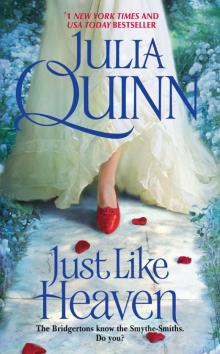 Just Like Heaven
Just Like Heaven B03.2 An Offer from a Gentleman Ep II
B03.2 An Offer from a Gentleman Ep II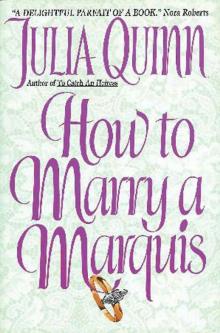 How to Marry a Marquis
How to Marry a Marquis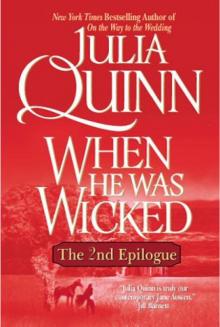 When He Was Wicked: The 2nd Epilogue
When He Was Wicked: The 2nd Epilogue Ten Things I Love About You
Ten Things I Love About You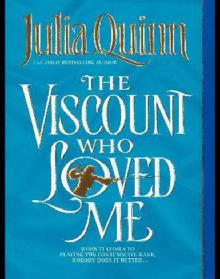 The Viscount Who Loved Me
The Viscount Who Loved Me The Duke and I
The Duke and I B05.2 To Sir Philip With Love Ep II
B05.2 To Sir Philip With Love Ep II An Offer From a Gentleman: The 2nd Epilogue
An Offer From a Gentleman: The 2nd Epilogue Minx
Minx On the Way to the Wedding with 2nd Epilogue
On the Way to the Wedding with 2nd Epilogue Mr. Cavendish, I Presume
Mr. Cavendish, I Presume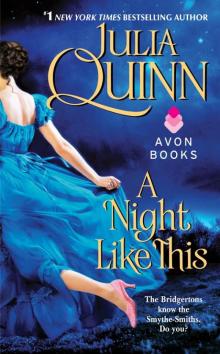 A Night Like This
A Night Like This Splendid
Splendid Everything and the Moon
Everything and the Moon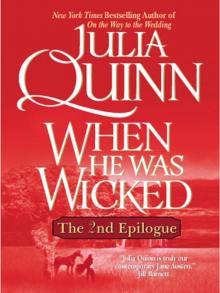 When He Was Wicked
When He Was Wicked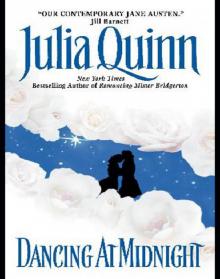 Dancing at Midnight
Dancing at Midnight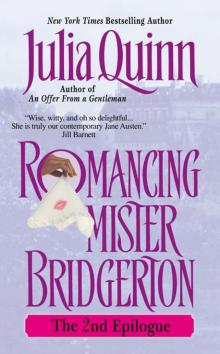 Bridgerton 04: 2nd Epilogue - Romancing Mister Bridgerton
Bridgerton 04: 2nd Epilogue - Romancing Mister Bridgerton The Lost Duke of Wyndham
The Lost Duke of Wyndham To Sir Phillip, With Love
To Sir Phillip, With Love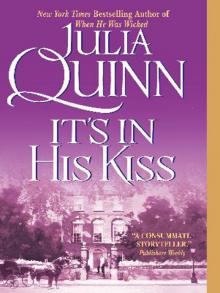 It's in His Kiss
It's in His Kiss The Other Miss Bridgerton
The Other Miss Bridgerton Bridgerton 02: 2nd Epilogue - The Viscount Who Loved Me
Bridgerton 02: 2nd Epilogue - The Viscount Who Loved Me The Secrets of Sir Richard Kenworthy
The Secrets of Sir Richard Kenworthy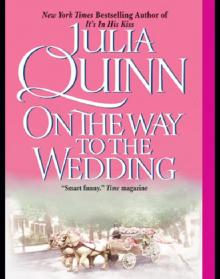 On the Way to the Wedding
On the Way to the Wedding The Secret Diaries of Miss Miranda Cheever
The Secret Diaries of Miss Miranda Cheever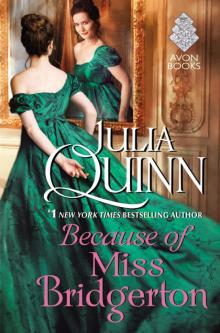 Because of Miss Bridgerton
Because of Miss Bridgerton What Happens in London
What Happens in London JQuinn - The Secret Diaries of Miss Miranda Cheever
JQuinn - The Secret Diaries of Miss Miranda Cheever The Girl With the Make-Believe Husband
The Girl With the Make-Believe Husband First Comes Scandal
First Comes Scandal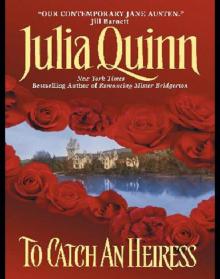 To Catch an Heiress
To Catch an Heiress The Sum of All Kisses
The Sum of All Kisses An Offer From a Gentleman
An Offer From a Gentleman The Bridgertons: Happily Ever After
The Bridgertons: Happily Ever After Bridgerton Collection Volume 1 (Bridgertons)
Bridgerton Collection Volume 1 (Bridgertons)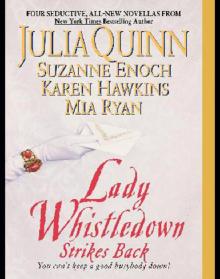 Lady Whistledown Strikes Back
Lady Whistledown Strikes Back Secret Diaries of Miss Miranda Cheever
Secret Diaries of Miss Miranda Cheever An Offer from a Gentleman with 2nd Epilogue
An Offer from a Gentleman with 2nd Epilogue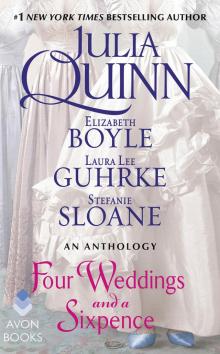 Four Weddings and a Sixpence
Four Weddings and a Sixpence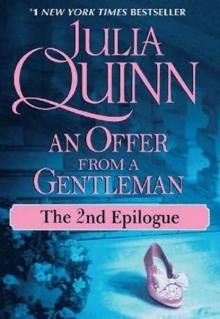 An Offer from a Gentleman: The Epilogue II
An Offer from a Gentleman: The Epilogue II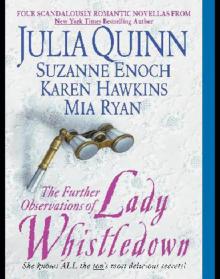 The Further Observations of Lady Whistledown
The Further Observations of Lady Whistledown The Viscount Who Loved Me: The Epilogue II
The Viscount Who Loved Me: The Epilogue II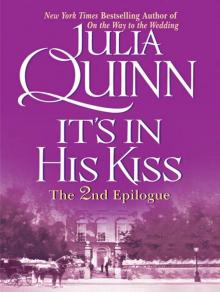 It’s In His Kiss Epilogue II
It’s In His Kiss Epilogue II To Sir Phillip, with Love: The Epilogue II
To Sir Phillip, with Love: The Epilogue II The Secret Diaries of Miss Miranda Cheevers
The Secret Diaries of Miss Miranda Cheevers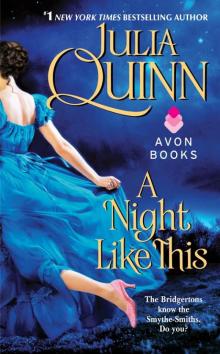 A Night Like This (Smythe-Smith Quartet)
A Night Like This (Smythe-Smith Quartet)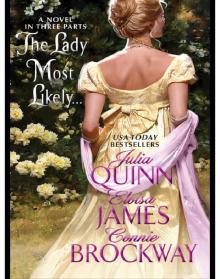 The Lady Most Likely...
The Lady Most Likely...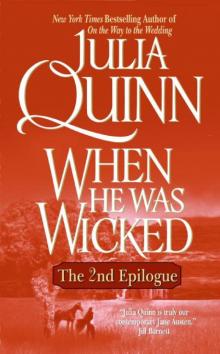 Bridgerton 06: 2nd Epilogue - When He Was Wicked
Bridgerton 06: 2nd Epilogue - When He Was Wicked Just Like Heaven sq-1
Just Like Heaven sq-1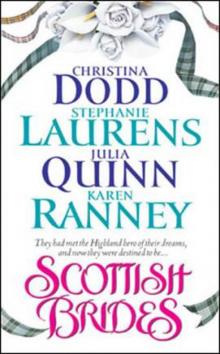 Gretna Greene
Gretna Greene